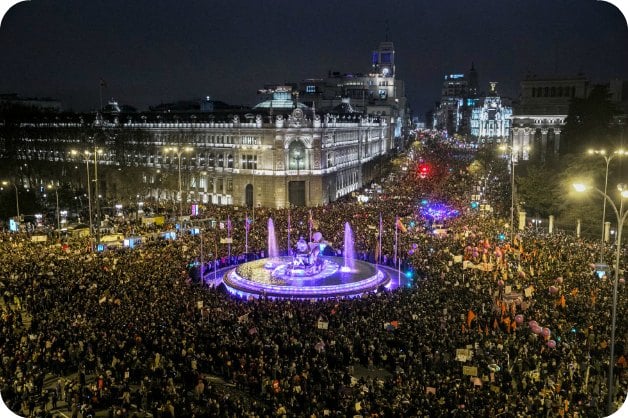To many people, last March 8th was a historic day for feminism. More than 40 countries across the world supported the feminist strike and, in Spain, according to some media, about 6 million people joined the protest.
The success of the strike in Spain was one of the most commented news in the media at an international level. Altogether, a public image of overt massive positioning.

Explicit and open positioning in an act of communication on a topic that was taboo until very recently.
But, are we sure that saying “I am a feminist” or “I promote feminist policies” out of the context of March 8th is no longer a taboo?
Tech events and feminisms
Leaving aside the strike’s success, and moving on to the technical environment I belong to, we can see that there are several events offering vacancies for women, codes of conduct that count on action plans in case of conflict, communities where women count on safe spaces, projects aimed at increasing the number of females at companies, educational workshops for awakening girl’s interests, etc.
Our labour sector seems to be the one getting more support regarding gender equality in Spain and, if you press me, at an international level too.
The truth is that I follow closely many of these projects and actions and it draws my attention that it seems like there’s a wide range of them but, when the chips are down, in hard times, it looks like all alarms are triggered and the idealistic view of committed actions goes up in smoke.
So, talking about technological events, I try to find in my mind the person who I think can be a voice of command and who can give me her opinion on the following: At technological events, are we as feminist as we think we really are?
More than 4 years and more than 100 events
I’m going to have today’s coffee with Alba Roza, an expert in covering techie events at an informative and journalistic level.

Alba Works for Autentia, a company covering at an informative level most events in Spain, as well as other international ones.
She tells me that she has been working there for four and a half years and has covered more than 100 events in this labour niche.
These figures are amazing, and, without a doubt, they make her be a voice of command on this issue!
Tackling the issue
Does Alba have the same feeling I have? Do we “support feminism” just for the sake of appearances at techie events, until problems arise?
Alba’s answers and opinion go along these lines:
-
Fashionable feminism
In the technological sector, which is supposed to be innovative, open-minded and very trendy, the fact of not supporting or not having feminist policies is frowned upon. This becomes a problem when there’s a conflict, since the initial support is no longer provided due to a lack of real involvement caused by the fear to deal with facts at issue.
Sadly enough, there have even been some well-known cases where events have had to be cancelled because of fears and pressures.
-
Organisations in disagreement with...
Alba tells me that there are some sponsors who cancel sponsorships because they don’t agree with, or because they are afraid of companies showing sympathy for certain feminist policies at public events. Unfortunately, the technological business reality changing pace is slower than we would like to, and sponsoring companies are the reflection of its greater or lesser openness.
She also tells me that there is a given profile of some individuals who criticise actions being taken, although she highlights as well that this is not so common, especially, when the format entails a name and a surname, and considering that their only intention is to make a noise about it.
-
Ineffective codes of conduct
I think that the simile Alba uses is quite representative: she compares it with a fire. It looks like events are starting to have codes of conduct where feminist policies are included, but, to tell the truth, they actually look more like a fire evacuation plan where nobody knows how to act in case of fire.
In fact, and through her own experience, when an individual oversteps his/her boundaries, we tend not to make public what happened so as not to damage the image of the organisation, but it is also true that companies organising events usually slip up with some of their answers as a result of their lack of experience, and not due to a real wilfulness.
It seems we are a step beyond where we were from a few years ago, but the current stage has a lot of theory with no experience on how to apply it.
-
Very positive examples
But don’t think that this is just a wasteland and that there are no events in which diversity and gender policies are successfully carried out and proclaimed in a positive and effective way.
Alba points out two of the events that have made a very good impression on her with regard to gender and diversity: Call of Data, Lambdaword and Wecodefest.
In fact, she highlights the proposal’s and talk development’s latent richness and diversity of these events where female participation is very sought after.
-
Hold an event with greater female participation
It is becoming apparent that, if you want to count on more female speakers, even if you want to increase the number of female attendees, you need to use different call and attraction strategies and come up with something more innovative than the traditional Call4Papers.
Among these techniques, Alba points out the network contacts, mentoring work and safe spaces in early stages.
-
Choose carefully your speakers
Something else to take into account when organising an event is to make sure that both your organisation and the speaker you have chosen share the same values so that your brand is not negatively affected by what he/she might say.
If your aim is to promote certain values, you’ll have to take care of making the right choice, since the speaker will be representing your company in front of the public, and you don’t want him/her to ruin your company’s image. This doesn’t mean the speaker needs to be pro-policies, but at least he/she should partly agree with and respect the policies of the organisation who is allowing him/her to speak.
-
Afraid to talk about...
Alba and I also talk about how to break free from those fears that everyone seems to have about approaching or backing feminist principles. Several scenes appear, scenes that I also see and that have a lot to do with extreme opinions and the support they receive without rejection, but always from one’s own and critical thinking.
Many people who want to ask or get closer to these principles do it shyly, and sometimes they don’t even dare to do it because of fears associated with making a mistake that may affect them publicly. We usually see it in social networks, and sadly and most commonly, reactions are mainly aimed at silencing those attempts to get closer to feminist principles.
-
Future and good luck
But, to Alba’s eyes, the global outlook is much more encouraging than just a few years ago and, even thought there’s still a lot to do, there are things that in this day and age are no longer publicly allowed:
There’s still a lot to do, but we’re heading the right direction, despite the fact that there are still fears, trends and mistakes.
A bittersweet taste altogether, but that at the same time is encouraging thanks to the small steps and achievements being made at a sustainable pace and within the possibilities of many people who work towards progress in this field.
What about you? What would you do when faced with this situation? Would you stand up for feminist policies with all your might at events, as millions of women dared to do on March 8th?
Real progress is only accomplished by involving oneself for better or worse. Nobody said it would be easy and comfortable and, on my behalf, the only thing left is to thank all those who are working hard towards a more egalitarian world.




